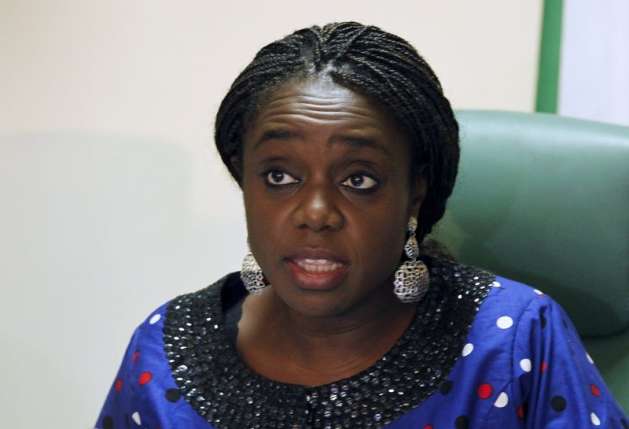- Why I Decided to Resign – Kemi Adeosun
Embattled former Minister of Finance, Kemi Adeosun, has given reasons for her decision to resign from her position in President Muhammadu Buhari’s cabinet.
In her resignation letter obtained by Punch, the former minister noted that she was shocked by the outcome of the investigation done on the allegation that her NYSC certificate which she had earlier tendered as Commissioner for Finance in Ogun State was not genuine.
She said not until the scandal broke out she never knew the certificate was not genuine.
Buhari had, on Friday, accepted the resignation of Adeosun as minister of finance. He also approved the Minister of State Budget and National Planning, Mrs. Zainab Ahmed, as her successor.
Adeosun’s letter read in part, “Let me commence by thanking you profusely for the honour and privilege of serving under your inspirational leadership.
“It has been a truly rewarding experience to learn from you and to observe at close quarters your integrity and sense of duty.
“I have, today, become privy to the findings of the investigation into the allegation made in an online medium that the Certificate of Exemption from National Youth Service Corp (NYSC) that I had presented was not genuine.
“This has come as a shock to me and I believe that in line with this administration’s focus on integrity, I must do the honourable thing and resign.
“Your Excellency, kindly permit me to outline some of the background to this matter.
“I was born and raised in the United Kingdom, indeed my parental family home remains in London. My visits to Nigeria up until the age of thirty-four (34) were holidays, with visas obtained in my UK passport.
“I obtained my first Nigerian passport at the age of thirty-four (34) and when I relocated there was debate as to whether NYSC Law applied to me. Upon enquiry as to my status relating to NYSC, I was informed that due to my residency history and having exceeded the age of thirty (30), I was exempted from the requirement to serve. Until recent events, that remained my understanding.
“On the basis of that advice and with the guidance and assistance of those, I thought were trusted associates, NYSC were approached for documentary proof of status. I then received the certificate in question. Having never worked in NYSC, visited the premises, been privy to nor familiar with their operations, I had no reason to suspect that the certificate was anything but genuine.
“Indeed, I presented that certificate at the 2011 Ogun State House of Assembly and in 2015 for Directorate of State Services (DSS) Clearance as well as to the National Assembly for screening. Be that as it may, as someone totally committed to a culture of probity and accountability I have decided to resign with effect from Friday, 14th September, 2018.”
She also thanked Buhari for his patience in finding the truth in the matter.
She stated, “Your Excellency, let me conclude by commending your patience and support, during the long search for the truth in this matter.
“I thank you again for giving me the honour of serving under your leadership, it is a rare privilege, which I do not take for granted.
“As a Nigerian and committed progressive, I appreciate you for your dogged commitment to improving this nation.”
Thanking the President for the opportunity to serve she said, “Your Excellency, It has been an exceptional privilege to have served our nation under your leadership and to have played a role in steering our economy at a very challenging time. I am proud that Nigeria has brought discipline into its finances, has identified and is pursuing a path to long term sustainable growth that will unlock the potential in this great economy.
“Under your leadership, Nigeria was able to exit recession and has now started to lay the foundations for lasting growth and wealth creation. Repositioning this huge economy is not a short term task and there are no short cuts, indeed there are tough decisions still to be made but I have no doubt that your focus on infrastructural investment, revenue mobilisation and value for money in public expenditure will deliver growth, wealth and opportunity for all Nigerians.
“I thank His Excellency, the Vice President and my colleagues in the Federal Executive Council for the huge pleasure and honour of working with them. I also thank most specially, the team in the ‘Finance Family’ of advisers and heads of agencies under the Ministry of Finance. Your Excellency, this group of committed Nigerians represent a range of backgrounds, ethnicities and ages.
“They have worked well above and beyond the call of duty to support me in the tasks assigned. The diversity in my team and their ability to work cohesively to deliver reforms, convinces me that Nigeria has the human capital required to succeed.”


 Naira3 weeks ago
Naira3 weeks ago
 News4 weeks ago
News4 weeks ago
 Naira4 weeks ago
Naira4 weeks ago
 Travel3 weeks ago
Travel3 weeks ago
 Naira3 weeks ago
Naira3 weeks ago
 Jobs3 weeks ago
Jobs3 weeks ago
 Naira3 weeks ago
Naira3 weeks ago
 Investment4 weeks ago
Investment4 weeks ago





























